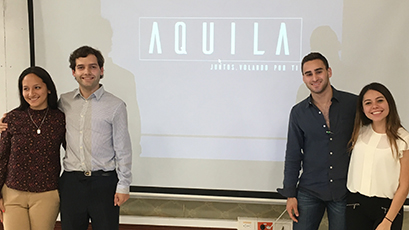The program is designed to increase students’ global business, entrepreneurial, cross-cultural and cross-functional competencies through adviser-guided collaboration and active participation in international, entrepreneurial-driven student teams. By working virtually and travelling to their respective countries, each team develops, presents and defends a business plan addressing the needs of a specific Latin American market, leveraging the entrepreneurial and technological expertise of its members, as well as others with whom they network.
“The Innovators for the Americas program gave me the opportunity to conduct in-country market research for our project that put me and my team in front of top Peruvian airline executives," said Altaïr Larbi Dahrouch, an entrepreneurship and marketing major who participated in the program. "This type of exposure to market research provides globally-minded students first-hand experience on what it takes to gather data in countries that don’t have similar databases to the U.S., a market research experience that is incomparable to anything you would do in a class setting," added Dahrouch, who is from Cabo San Lucas, Mexico.
This year’s program featured 23 students, six from the University of Miami; five from the Instituto Tecnológico y de Estudios Superiores in Monterrey, Mexico; three from Universidad ICESI in Cali, Colombia; four from the Universidad del Pacífico in Lima, Peru; and five from the Universidad Adolfo Ibáñez in Santiago, Chile. Greg Smogard, director of the University of Miami program and four professors from the Latin American institutions served as mentors for the students throughout the program’s 14-week period.
“The Innovator’s for the America’s program is an innovative, experiential learning course designed to develop a global mindset, cross-cultural collaboration and ‘hands on’ experience for entrepreneurship, international business and engineering students,” said Smogard. “By partnering with these top academic institutions in Latin America, students from different backgrounds can leverage their cultural and academic expertise to develop and present comprehensive business plans, further promoting the School’s dedication in fostering global business perspectives and collaboration amongst students.” The program also supports the University of Miami’s vision to become a hemispheric innovation hub.
The students were divided into five teams. Each team developed a business plan addressing a specific issue pertaining to a Latin American country and then presented and defended the plan in front of a panel of judges comprised of entrepreneurs, investors and professors.
The first team selected Peru and created a business plan to develop an alliance for low-cost Peruvian airlines to help improve their operations, marketing and customer relationships.
The second team worked with Chile and developed an online, e-commerce platform to assist local and indigenous Chilean artisans to access greater markets and sell more products. Through the provision of online storefronts, a business plan was designed to promote both local artisan's existing products as well as new products based on an artisan's designs.
The third team also selected Peru, however, its business plan was to utilize drone technology and software to help Peruvian agricultural cooperatives improve their members’ production and income. The plan’s primary focus was to work with local municipalities and cooperatives to provide both the technology and online platform to view results and recommendations.
The fourth team worked with Colombia and created a business plan that featured the development of a comprehensive, online information platform to assist the Colombian eco-tourism industry along with international ecotourists planning their trips to Colombia through the provision of travel planning, tour packages, reviews and pricing information.
The fifth and final team selected Mexico and the team’s business proposal showcased the collaboration with local haciendas and hotels in the Yucatan Peninsula to provide luxury camping/eco-tourism experiences to international and local travelers. During tourist stays at local hotels in Merida and Cancun, the company would provide overnight, luxury camping, eco-tourism experiences, which would provide comfortable camping experiences for tourists while supporting and increasing tourism income for local communities.
“The students presented well-prepared, thorough and innovative business plans addressing various issues in select Latin American countries,” said Smogard, who accompanied the students in Colombia. “We are happy to have had the opportunity to collaborate with such prestigious Latin American universities and their students to further our mission in building upon our world-class international business community.”

